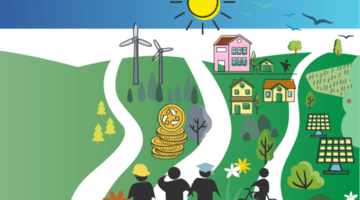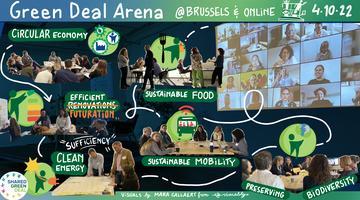Pathways to a more just & sustainable Europe
Can you use the same breath to speak both hope and caution? Be deeply critical and supportive at the same time? However tricky that might be, it seems exactly the right tone for this third decade of the twentieth century – the transition twenties, if we may be so free to call it that. It was therefore the goal of the SHARED GREEN DEAL Transition Arena event series, hosted by DRIFT in the later half of 2022.
This report synthesises what the participants at the SHARED GREEN DEAL Transision arenas saw as the state of transitions in Europe, and what pathways lie ahead toward a more just and sustainable Europe in 2050.
For these arena events, DRIFT recruited 189 changemakers working locally, nationally and at the pan-European level. These policy workers, government officials, entrepreneurs, researchers and other folks to discuss – hopefully and cautiously – justice and sustainability across six Green Deal policy priority areas: from clean energy to the circular economy, from biodiversity to mobility and from food to renovations.
In this report, you can find the results of their co-creative efforts over the second half of 2022. What did the participants already see happening ‘out there’ contributing to Green Deal objectives in practice? And what future images and transition pathways did participants see towards a just and sustainable 2050?

Publication date:
Languages: English
Related Green Deal Priorities
Related news


CONTACT
For further details please contact co-leads Professor Chris Foulds (chris.foulds@aru.ac.uk) and Professor Rosie Robison (rosie.robison@aru.ac.uk).

This project has received funding from the European Union’s Horizon 2020 research and innovation program under grant agreement No 101036640. The sole responsibility for the content of this website lies with the SHARED GREEN DEAL HAS project and does not necessarily reflect the opinion of the European Union.
